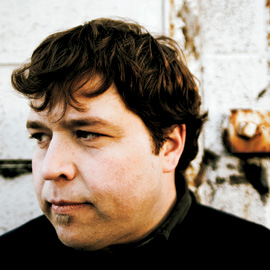The Gospel According to Miller
Blue Like Jazz Author Donald Miller to Students:
“Engaging Culture Is Not Rocket Science”
While many mainstream readers are rediscovering a treasure
trove of great 20th-century Christian writing, thanks to the
resurgence of interest in C.S. Lewis and J.R.R. Tolkien, several
prominent contemporary
writers are publishing works that pour powerful Christian
ideas into popular “new wineskins.”
 
Portland writer Donald Miller has blazed trails for faith dialogue through his books, on the campus of Reed
College, and beyond. |
 |
 |
Anne Lamott is in the spotlight again
for her sequel to Traveling Mercies, titled
Plan B: Further Thoughts on Faith. Bob Ekblad’s
Reading the Bible With the Damned explores the rich
resources of Scripture, and the awkwardness that comes when
Christians try to present the Bible to unbelievers. Brian
McLaren offers A Generous Orthodoxy, which calls
for spiritual unity among disparate Christian traditions,
and which is becoming a fundamental text for a new generation
of Christians known as “the emerging church.”
Add Donald Miller’s name to the list, if you haven’t
already. Thirty-four-year-old Miller has an enthusiastic following
— particularly among younger readers — because
of a unique storytelling
style that stokes the fires of spiritual inquiry in those
who shy away from sermonizing.
Miller’s visit to Seattle Pacific University on December
1, 2005, was eagerly anticipated by
students, not to mention faculty, staff, and visitors to campus.
Many read
his bestselling memoir,
Blue Like Jazz, subtitled
Nonreligious Thoughts
on Christian Spirituality (Nelson Books, 2003), and his
recent, rowdy, and revealing study of Christian ideas called
Searching for God Knows What (Nelson Books, 2004).
His latest work, Through Painted Deserts (Nelson
Books, 2005), is a revision of his first book, Prayer
and the Art of Volkswagen Maintenance. This February,
his reflections on growing up in a single-parent home, titled
To Own a Dragon (Navpress
Publishing Group, 2006), will arrive.
A native of Houston, Texas, Miller has had an unlikely influence
on the campus of Reed College in Portland, Oregon. After Volkswagen
Maintenance
was published in 2000, he audited classes at Reed, and mounted
a memorable stunt. He set up a campus confession booth ...
with a twist. Booth visitors found Miller and other Christians
confessing, apologizing for historical missteps of the church.
Through open, nonconfrontational
conversations, Miller helped to revise the prevalent understanding
of Christianity
for seekers, emphasizing the gospel instead of political views
or behavioral codes. On a campus unfriendly toward evangelism,
his efforts made faith in Christ an acceptable topic of conversation.
In anticipation of Miller’s visit to Seattle Pacific,
Response asked what he would advise believers seeking to engage
today’s culture.
Q| What have you learned that might be helpful for Christian
university students who are hoping to change the world?
A| I think one of the misconceptions of the university experience
is that you are “preparing”
to go out and change the world. The truth is [that] the students
who are going to have an impact after they graduate are probably
already having an impact now. They may be volunteering at
a shelter, writing for the school paper, protesting corporate
greed, or helping the disabled. Our hearts are not going to
change when we get out of school. We are not suddenly going
to become activists, just because we have a slip of paper.
I should also say that even those who are already active
in social concerns do so, often, out of a kind of discipline.
It may not be something we want to do, but the question is
… do we want to contribute to solutions? If we do, it
is going to take some personal initiative,
and some discipline.
But, yeah, engaging culture is not rocket science. You really
have to work very hard not to see a million ways to get involved.
Q| What does it take to equip students for immersion in mainstream
culture?
A| There is a great deal to be said about attending a Christian
university and surrounding
yourself with believers. For those wanting to strengthen their
faith and their knowledge of Scripture, and to understand,
fully, a Christian worldview, a place like SPU is fairly perfect.
The drawbacks are that we run the risk of isolating ourselves
from people who aren’t like us. It is possible these
days to grow up in a Christian home, only go to Christian
schools, graduate and get a job at a church or Christian
business, and never get to know anybody who isn’t exactly
as we are.
Because of this, I recommend joining some kind of organization
that is a departure from the evangelical bubble. There are
plenty of organizations committed to creating a global culture
where humans are treated decently.
If we are only surrounded by people who validate
our opinions, we are not learning to be people of influence.
— BY Jeffrey Overstreet
Back to the top
Back to Home
|
